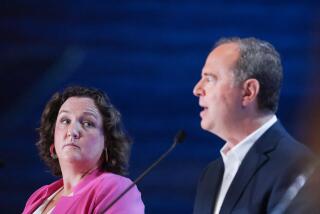FBI Follows Money in Tribe’s Beltway Success
- Share via
MASHPEE, Mass. — Everybody got something.
The Mashpee Wampanoags, famed for greeting the Pilgrims at Plymouth, will be named a nationally recognized tribe -- a designation they sought for 30 years so that they could benefit from federal aid programs.
Jack Abramoff, the lobbyist embroiled in a Washington corruption scandal, and his firm championed the Indians’ cause and pocketed tens of thousands of dollars in tribal money.
And Rep. Richard W. Pombo (R-Tracy), chairman of the influential House Resources Committee, landed a lucrative source of political donations: the small group of Native Americans whose ancestral lands are about as far from his Northern California district as one can get in the United States.
The trifecta of money, politics and power that quietly came together over the last several years has attracted the attention of a federal law enforcement task force investigating the burgeoning Abramoff scandal.
FBI officials have visited the tribal offices here to obtain financial documents, and other task force investigators in Washington are reviewing what role political leaders and others played in the Mashpee’s success.
Where the investigation will lead is unknown. But several people close to Abramoff have pleaded guilty in other aspects of the wide-ranging scandal. And in recent days, several Capitol Hill lawmakers, including Pombo, have returned donations from Abramoff or turned the money over to charity.
Officials do know that the flow of cash from the Mashpee to Abramoff and Pombo is a textbook example of the kind of cases of alleged influence-buying that the task force is assembling.
But what investigators want to determine is whether the Mashpee episode crossed the line into criminal behavior, as other Abramoff ventures allegedly did.
Those involved say no laws were broken and instead tell the story of one of America’s most fabled Native American tribes and how the Mashpee have petitioned for government recognition for three decades.
Unlike other tribes that hired Abramoff, the Mashpee weren’t in the casino business; gambling is illegal in Massachusetts. The tribe sought official recognition to qualify for a raft of federal benefits.
After years of languishing on a long list of tribes seeking Interior Department designations, the Mashpee Tribal Council concluded that its efforts were going nowhere.
So three years ago, the tribe began spreading tens of thousands of dollars around Washington.
It appeared to work. On Oct. 1, in a settlement of a lawsuit against Interior Secretary Gale A. Norton, the tribe was placed on “active” consideration status for recognition.
After a final round of reviews, the Mashpee will probably be officially recognized by March 30, 2007.
The settlement would permit the Mashpee to seek a casino license if Massachusetts legalizes gambling.
Tribal Council President Glenn Marshall and tribal chief Vernon Lopez acknowledged in separate interviews that their unconventional strategy had paid off. “Sometimes,” Lopez said, “it’s necessary to go out of your way to get some of the things you need.”
Pombo, whose congressional district straddles California’s Central Valley, was clearly their biggest champion.
Now in his seventh term, he went to Washington on the cusp of the GOP revolution in Congress and soon hitched himself to Rep. Tom DeLay, the Texas Republican who became House majority leader.
Their friendship was born of a shared conservative ideology. Like DeLay, Pombo has worked to reduce government regulations and to cut taxes and spending. And he has strongly advocated private property rights, sometimes to the chagrin of environmentalists.
DeLay sponsored Pombo’s successful 2003 drive to become chairman of the Resources Committee, which oversees Native American affairs. The post was seen as a coup for Pombo. One disgruntled rival for the chairmanship publicly attributed Pombo’s rise to his fundraising prowess.
But the Capitol Hill landscape has sharply altered since. DeLay is fighting money-laundering charges in Texas and has had to leave his House leadership post. Abramoff reportedly is near a plea agreement with federal prosecutors. And Pombo, through his work on behalf of the Mashpee, has attracted investigators’ attention as well.
Pombo, 44, did not reply to several requests for interviews this week.
His Resources Committee spokesman, Brian Kennedy, said the chairman had simply been trying to draw attention to “the poster tribe on the need for reforming the recognition process.”
Kennedy said Pombo first learned of the Mashpee when the son of Pombo’s chief of staff learned during a school project that the tribe that greeted the Pilgrims had been trying since 1975 to win federal recognition. “That’s sort of how the chairman got engaged,” Kennedy said.
The Mashpee also were getting to know Pombo.
According to tribal spokesman Scott Ferson, half a dozen tribal leaders attended several Pombo fundraisers and eventually wrote $2,000 personal checks to the lawmaker’s Rich Political Action Committee.
In all, at least $20,000 in Mashpee money flowed into Pombo’s coffers soon after a September 2003 meeting the congressman had with Norton and R. Lee Fleming, who oversees the Native American recognition program.
The two-week run of donations accounted for about 5% of Rich PAC’s roughly $400,000 in revenue for the 2003-04 election cycle, according to two databases of political contributions.
Said Ferson: “Contributions to political candidates are perfectly legal ... and Pombo became our friend.”
According to two people familiar with the 2003 meeting -- one who requested anonymity because of the investigation -- Pombo was forceful in asking whether the government was “holding things up unnecessarily” against the Mashpee.
The other person, Robert E. Jordan III, the Washington lawyer representing the Mashpee, said Pombo “was pressing his views.”
“My impression was he was genuinely aghast at the glacial pace of the whole recognition process and thought something ought to be done,” Jordan said.
Norton’s office said it could not recall the meeting, and Fleming did not return phone calls.
But Fleming has publicly defended the way his office handles the often-cumbersome recognition process. He has said his staff is too small to handle all the petitions from various tribes, and that some requests entail up to 30,000 pages of documents for review.
The federal recognition process traditionally has been a lengthy one. The government reviews a tribe’s history and ancestry as well as the genealogy of its members to determine whether it is a bona fide Native American tribe. A federally acknowledged tribe is eligible for special housing, education, healthcare and other federal programs.
In his advocacy for the Mashpee, Pombo led a special committee hearing in 2004. He was seeking support for a bill he sponsored allowing tribes that had petitioned for recognition before 1988 -- the year of an explosion of Indian casinos and of tribes’ petitions for federal recognition -- to be moved to the head of the line. The still-pending bill would apply to about a dozen tribes, including at least two from California, according to Interior Department records.
Pombo called it “unconscionable” that the Mashpee had not already gotten what they wanted. He added: “The tribe is being told it may have to wait 10 or more years for a decision. The tribe could wait a half-century before obtaining a final determination.”
At the 2004 hearing, Pombo called Tribal Council President Marshall as his first witness.
“We loaned the Pilgrims the moorings to land their boats, and we have been paying for it ever since,” Marshall testified. He added: “It has taken me a long time to understand the workings of the government.”
This spring, Marshall and other tribal members made more payments, including at least $20,000 to two political committees controlled by Pombo.
The congressman has come under fire in recent months from a fellow Californian on the House Resources Committee, George Miller (D-Martinez), who has strongly urged the chairman to hold hearings and investigate Abramoff’s alleged lobbying improprieties on behalf of other Native American tribes seeking help for casinos.
In the latest in a series of letters, Miller told Pombo this month: “The American people need to know, and deserve to know, the impact that lobbyists and their allies within Congress and the administration have had on public policy and the public interest.”
But Pombo has largely deflected Miller’s concerns. Instead of opening his own investigation into Abramoff, he forwarded Miller’s letters to federal prosecutors. “Any allegations of criminal matters of this sort are best addressed by the Department of Justice,” he told Miller.
Abramoff and his colleagues also were working behind the scenes for the Mashpee.
Ferson said tribal leaders contacted Abramoff and his associates because “we knew he was the go-to firm.” The tribe paid the lobbyists $40,000, much of it from Detroit casino developer Herbert J. Strather.
Ferson said Strather knew when making the donation that gambling was illegal in Massachusetts. Strather did not return repeated phone calls.
Documents released by the Senate Indian Affairs Committee show Abramoff at work for the Mashpee. In a December 2002 e-mail, Michael D. Smith, one of Abramoff’s associates, advised his boss that the government had “unfairly held them up” for recognition -- mirroring the questions Pombo would later pose in his meeting with Norton.
Three months later, Abramoff e-mailed one of Norton’s former political aides, advising that “this regards the tribe in Massachusetts, and is quite urgent.... Let me know if you think this is something we can raise urgently” with officials at Interior.
The strategy to spend money on politicians and lobbyists has troubled some tribal members.
“I think it’s disgusting,” Stephanie Tobey-Roderick said. Abramoff and Pombo “were obviously taking money for their own political gain. It’s all crooked. It’s all messy.”
When the tribe filed its petition for recognition in 1975, it wanted federal housing, education and healthcare assistance.
Though the Mashpee effort predated the casino boom, their lawyer said they “would probably be interested” in a gaming license if the state law was ever lifted.
Times staff writer Walter F. Roche Jr. contributed to this report.
More to Read
Sign up for Essential California
The most important California stories and recommendations in your inbox every morning.
You may occasionally receive promotional content from the Los Angeles Times.














